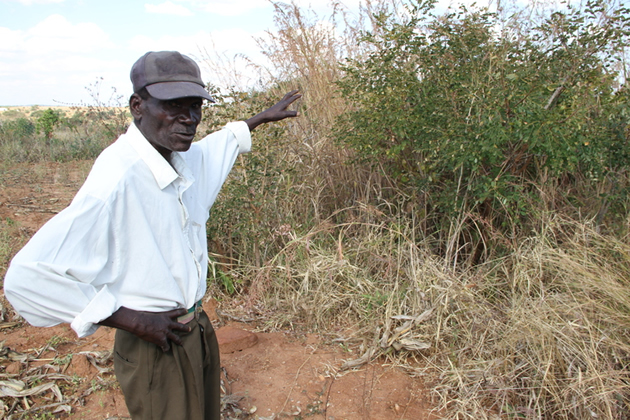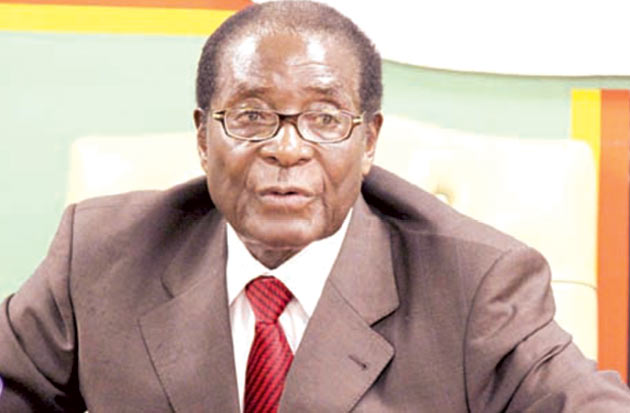Shocking tale of a killer dad


Matau area Chief Ephraim Katemanyoka points to Ronald’s grave in Manyumwa village, which has not been maintained in years and is now overgrown with shrubs
Roselyn Sachiti Features Editor
ON June 11, 2007 a Hurungwe father, Bigknows Wairosi, murdered his son, Ronald (9), while his younger son, Tawanda (7), helplessly watched. Two years later, Tawanda – the only witness to the murder – stood in court to testify against the man whose fatherly love turned upside down.
The murder broke all family bonds.
Wairosi’s mother, Eneresi Siamukonde, also testified against her son exposing his lies in court.
On March 7, 2011, Wairosi was convicted and sentenced to death by hanging for the ritual murder of Ronald.
Wairosi (35), from Karoi, struck his son twice on the head with a stone, then cut off his right ear with a pair of scissors before collecting his blood in a lunch box, the Harare High Court heard.
Wairosi pleaded not guilty to the murder, but was convicted by judge Justice Tendai Uchena who heard Tawanda’s testimony.
At the Supreme Court, Wairosi appealed against both conviction and sentence.
A fortnight ago, Justice Anne-Mary Gorowa, sitting with Justices Vernanda Ziyambi and Susan Mavangira, did not find fault with the decision of the High Court of April 2011, which condemned Wairosi to death.
They dismissed the appeal possibly putting an end to this case.
What now stands between him and the hangman’s noose is the new Constitution and possibly Presidential pardon, if he is lucky.
But, the chilling details of the murder as narrated by Tawanda show how cold hearted his father is.
Tawanda told the court how on June 11, 2007, Wairosi came to Chivakanenyama area, Manyumwa Village, and informed their grandmother that he wanted to take them to obtain birth certificates in Karoi.
The late Ronald and Tawanda were staying with their paternal grandmother at that time since Wairosi had remarried and was living with his new wife in Banket.
The following day, despite their grandmother’s protestations, Wairosi left with his two sons.
In Karoi, they proceeded to Madiro Supermarket where they boarded a single cab truck with three other male occupants.
“The driver was alone in the front and the other two dressed in black were seated at the back in the cab,” Tawanda testified against his father.
They travelled along Chiumbarukwe Road and gruesome events followed.
In a bush some 800 metres away, Wairosi picked up a large stone and struck Ronald on the head.
Tawanda ran off into the bush where he spent the night alone.
The following morning, a Munyaradzi Kondo spotted Tawanda wandering in the grazing area of Sandara Farm and a report was made.
On June 16, 2007, Japhet Mauzeni, a security guard with Sandara Farm, discovered Ronald’s remains in the grazing area.
He made a police report. A pathologist confirmed that Ronald died as a result of head injuries.
Wairosi’s mother, Eneresi, also gave evidence which corroborated Tawanda’s in relation to his visit to their homestead.
She narrated how he came to collect the two kids under the pretext of taking them to Karoi for birth registration and how he returned with only one child four days later.
During trial, she told the court that Wairosi had lied to her: “He then said that the men were fighting him, he managed to grab Tawanda threw him away and the other remained.
“He then said that when they had remained he managed to grab an iron bar and he struck one of the two guys on the legs and the driver came out with a knife.
“He said that he fled with Tawanda. He then said that Ronald remained in the vehicle of the murderers. I then asked as to whether Ronald had been tied since he could not check on that.
“When I asked him about Ronald he said that he could not check on that because he was also being attacked … When he told me that the other child had remained in the vehicle of these murderers I started crying telling him that I had advised him earlier on to leave the children because there was going to be a mobile registration exercise and he could not take my advice.”
His lies were further exposed. According to his mother, Wairosi did not have any injuries to substantiate his claims.
He did not challenge his mother’s testimony.
There were also major discrepancies between Wairosi’s defence outline and evidence.
During investigations, Wairosi – who desperately wanted to be ruled out as a person of interest – further raised suspicion by injecting himself into the case when he made countless trips to Karoi police to “check” on the progress of the investigation.
What could have led him to this uncanny behaviour?
Did a deadly delusion drive him to kill?
Was it for the love of money?
Villagers of Murambiwa Village, Chief Nematombo area, where Wairosi married his second wife and visited often where shocked by the murder, and not the court outcome.
Mbuya Theresa Musiiwa (75), who is his second wife’s grandmother and was regular host whenever Wairosi visited, said he penned his own fate.
She says Wairosi deceived her as he wanted to use her as an alibi.
On the day he murdered his son, Wairosi passed through Mbuya Musiiwa’s home where he spent the night.
There was nothing suspicious about this stopover as he always slept at her home whenever he visited his in-laws who live a few houses away.
On this day, he was his usual self, she says, his happy-go-luck smile masked his sinister secret.
“Some guzzlers where drinking traditional brew at my house that day. Wairosi did not drink or smoke and just sat among them.
“I cooked sadza and vegetables for dinner but he refused to eat. He said he was okay. I thought maybe he had eaten where he had spent the day. I did not suspect anything,” she said.
The following day, Wairosi woke up early and told Mbuya Musiiwa that he had to leave.
“He said his mother called and his two children Tawanda and Ronald were missing.
“That is the last I saw him,” she said.
The next time Wairosi’s name came up was when police knocked at her door.
Outside was a police car carrying a coffin.
“My late son spoke with them. They wanted us to identify the body since they heard that we were related to Wairosi. I did not look at the child since I had never seen him before.
“He lived with his grandmother in the Zvipani area. Wairosi had left the child’s mother and married my grandchild. The police asked for a rope to tie the coffin and left. By then, I did not know Wairosi had killed his own flesh and blood. I heard the child was buried near Zvipani,” she said.
Mbuya Musiiwa believes the motive behind the murder was greed.
“Why should someone kill his child to get money when many people here are farming? There are some people from this village who slept on goat skins but are driving cars because of hard work,” she added.
She believes when his time to be eventually hanged comes, if it comes, Wairosi will have to answer to his late son.
“The child will be waiting for him and ask him why he ended his life in such a gruesome way,” she added licking snuff from the palm of her hand.
From the time she spent with Wairosi, Mbuya Musiiwa learnt that he grew up in the farming community where his father worked.
Wairosi’s family also never stayed in one area for too long.
“I think he got the crazy ideas from the farms. Some people from the farming communities love using juju so much,” she revealed.
She thought Wairosi had been hanged and was disappointed to learn that he was alive and eating sadza at Government’s expense everyday.
“Are you telling me that man is still alive? I thought they killed him a long time ago. To me this is his second death,” she says.
In Zvipani, only older villagers like Sekuru Nimrod Tadzimirwa, who had a brush with Wairosi, remember him and his rather eerie behaviour.
He said on the surface he seemed normal, but he thinks there was a dark side to him that most people did not know.
“My field is close to a dam and I would see him a lot. He was a private person and would spend most of his time fishing in the dam near Chivakanenyama. I heard he was also a cattle rustler and that the late businessman Kitsiyatota was behind the killing. I heard he got a lot of money back then, $40 million Zimbabwean dollars for killing his son,” he claimed.
As news of the murder spread in the village, so did the terrible sense of loss.
“We were shocked and sad when we heard he killed the older son and cut of his ear and also took some blood.
“I have 19 children but I will never do such a thing even if I fail to feed them. He deserves to die,” he said.
Just next to his parent’s former home in Manyumwa village is Ronald’s grave.
The grave, just a heap of stones, has not been maintained in years and is covered in a thicket of vegetation.
Their former home is now a maize field after the buildings were demolished.
Unknown to many in the village, his parents also led a private life.
Even village head John Meka did not seem to know them that much.
He said Wairosi’s parents left the village in a huff following the gruesome murder.
“Wairosi’s father, who was a traditional healer, also kept to himself and not many villagers went to their homestead, save for his clients.
“After the murder the family did not stay long in the area. I did not even have all their personal details in my registration book. But they had stayed in many other places before coming here.
“I just heard that Wairosi left with his property in a donkey- drawn cart. They did not even tell me they were leaving. I heard the father is in Binga while his mother and Tawanda are somewhere in Harare,” he said.
The murder even shocked traditional leaders like Chief Lovemore Karengesha of the Nematombo area.
He says the Supreme Court’s ruling was fair.
“He took the life of his son before he could fully live it.
“Why then should the court allow him the freedoms he denied another?” he asked.
Greed, he adds, led to the murder.
Matau area Chief Ephraim Katemanyoka was also stunned by the murder.
“I have never come across anything like this. This is pure love for money,” he said.
Even though he agreed that murder is wrong in all its extremities, he believes the death sentence is too harsh.
A life sentence could have been proper, he adds, so that Wairosi learns from his mistake.
He added that Wairosi’s relatives should have paid seven cattle to the mother of the murdered child within a year.
“He did not conceive the child alone. He had a wife whose ancestors will not be happy and need appeasement,” he added.
From the events of his life, Wairosi is an unusual father who thought that killing his child would make his life better.
When he murdered his son, Wairosi seemed to forget that villagers everywhere burn the beak of a chicken that eats its own eggs and that is what the court did to him.
- Feedback: [email protected] or [email protected]








Comments